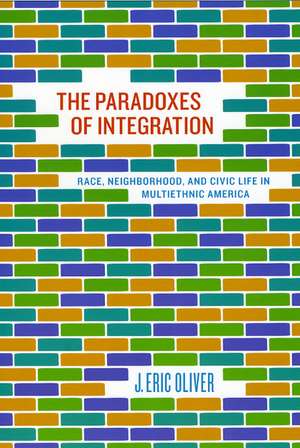The Paradoxes of Integration: Race, Neighborhood, and Civic Life in Multiethnic America
Autor J. Eric Oliveren Limba Engleză Paperback – 24 mai 2010
The United States is rapidly changing from a country monochromatically divided between black and white into a multiethnic society. The Paradoxes of Integration helps us to understand America’s racial future by revealing the complex relationships among integration, racial attitudes, and neighborhood life.
J. Eric Oliver demonstrates that the effects of integration differ tremendously, depending on which geographical level one is examining. Living among people of other races in a larger metropolitan area corresponds with greater racial intolerance, particularly for America’s white majority. But when whites, blacks, Latinos, and Asian Americans actually live in integrated neighborhoods, they feel less racial resentment. Paradoxically, this racial tolerance is usually also accompanied by feeling less connected to their community; it is no longer "theirs." Basing its findings on our most advanced means of gauging the impact of social environments on racial attitudes, The Paradoxes of Integration sensitively explores the benefits and at times, heavily borne, costs of integration.
J. Eric Oliver demonstrates that the effects of integration differ tremendously, depending on which geographical level one is examining. Living among people of other races in a larger metropolitan area corresponds with greater racial intolerance, particularly for America’s white majority. But when whites, blacks, Latinos, and Asian Americans actually live in integrated neighborhoods, they feel less racial resentment. Paradoxically, this racial tolerance is usually also accompanied by feeling less connected to their community; it is no longer "theirs." Basing its findings on our most advanced means of gauging the impact of social environments on racial attitudes, The Paradoxes of Integration sensitively explores the benefits and at times, heavily borne, costs of integration.
Preț: 148.02 lei
Preț vechi: 183.98 lei
-20% Nou
Puncte Express: 222
Preț estimativ în valută:
28.33€ • 30.79$ • 23.81£
28.33€ • 30.79$ • 23.81£
Carte indisponibilă temporar
Doresc să fiu notificat când acest titlu va fi disponibil:
Se trimite...
Preluare comenzi: 021 569.72.76
Specificații
ISBN-13: 9780226626635
ISBN-10: 0226626636
Pagini: 216
Ilustrații: 43 line drawings, 2 maps
Dimensiuni: 152 x 229 x 13 mm
Greutate: 0.3 kg
Editura: University of Chicago Press
Colecția University of Chicago Press
ISBN-10: 0226626636
Pagini: 216
Ilustrații: 43 line drawings, 2 maps
Dimensiuni: 152 x 229 x 13 mm
Greutate: 0.3 kg
Editura: University of Chicago Press
Colecția University of Chicago Press
Notă biografică
J. Eric Oliver is professor of political science at the University of Chicago. He is the author of Fat Politics: The Real Story behind America’s Obesity Epidemic and Democracy in Suburbia.
Cuprins
Acknowledgments
Introduction: Place and the Future of American Race Relations
Chapter 1. Why Place Is So Important for Race
Chapter 2. Racial Attitudes among Whites, Blacks, Latinos, and Asian Americans
Chapter 3. Neighborhood- and Metropolitan-Level Differences in Racial Attitudes
Chapter 4. Geographic Self-Sorting and Racial Attitudes
Chapter 5. Interracial Civic and Social Contact in Multiethnic America
Chapter 6. The Civic and Social Paradoxes of Neighborhood Racial Integration
Chapter 7. On Segregation and Multiculturalism
Appendix A: Data Sources
Notes
References
Index
Introduction: Place and the Future of American Race Relations
Chapter 1. Why Place Is So Important for Race
Chapter 2. Racial Attitudes among Whites, Blacks, Latinos, and Asian Americans
Chapter 3. Neighborhood- and Metropolitan-Level Differences in Racial Attitudes
Chapter 4. Geographic Self-Sorting and Racial Attitudes
Chapter 5. Interracial Civic and Social Contact in Multiethnic America
Chapter 6. The Civic and Social Paradoxes of Neighborhood Racial Integration
Chapter 7. On Segregation and Multiculturalism
Appendix A: Data Sources
Notes
References
Index
